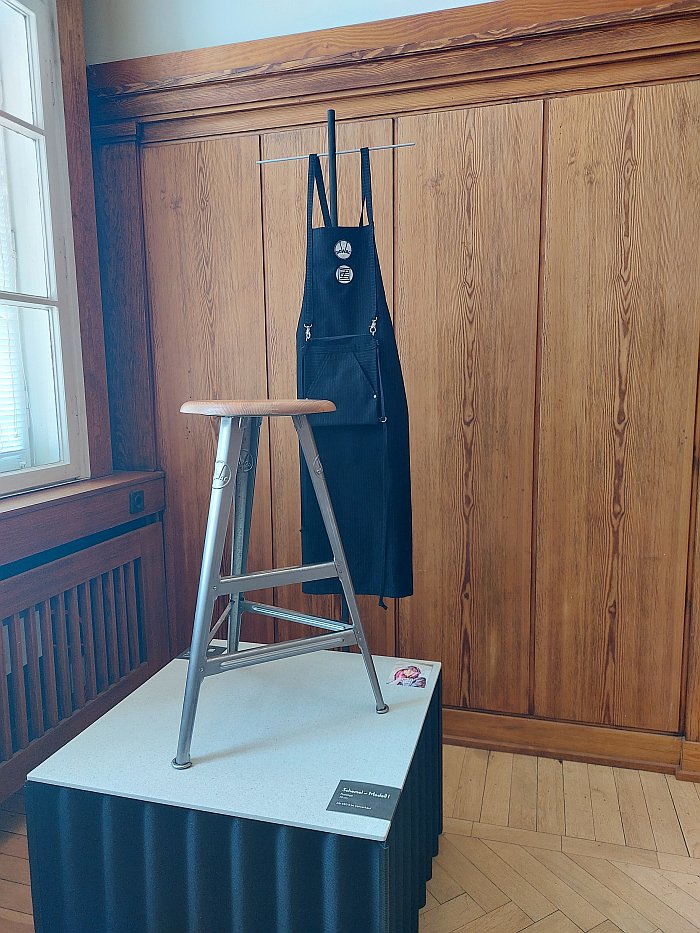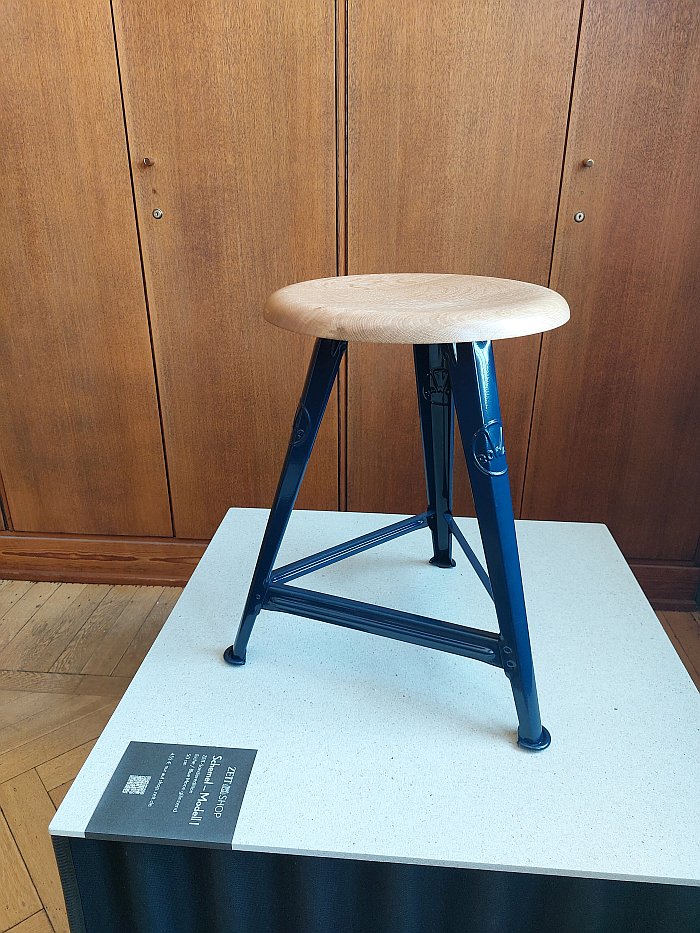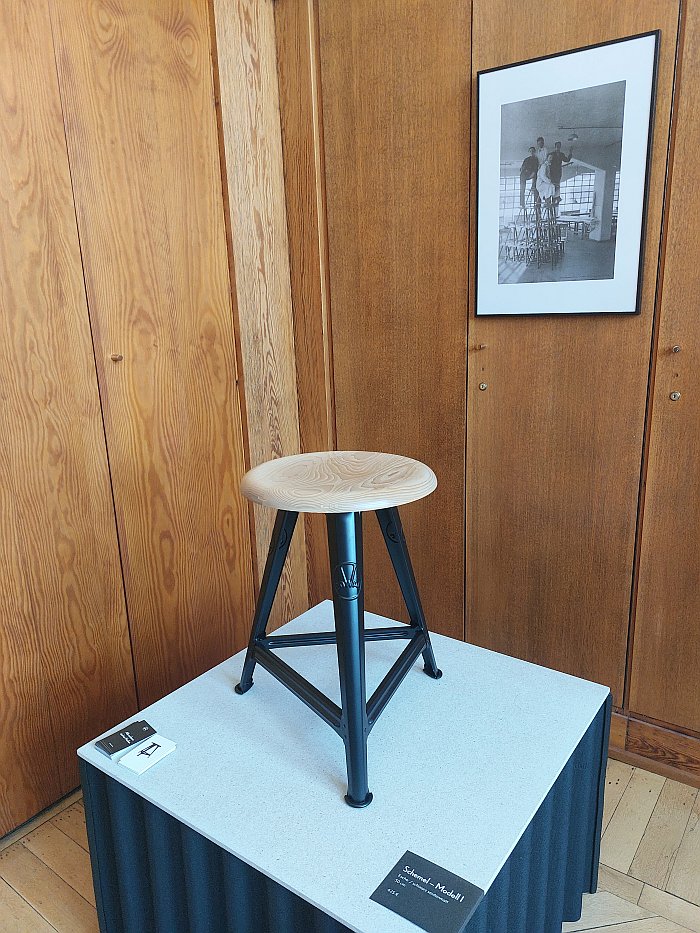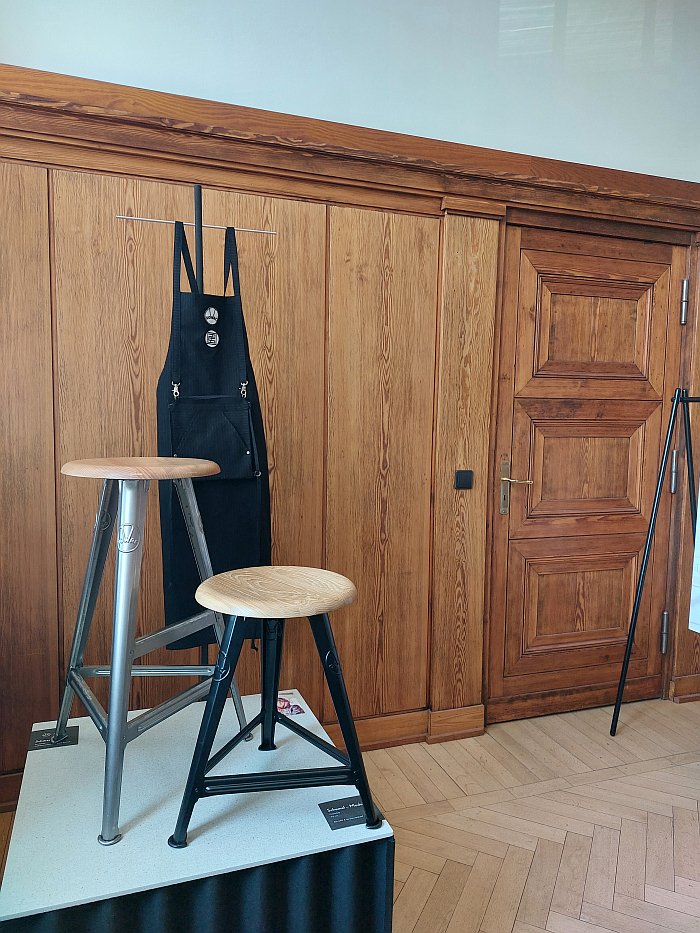Bauhaus | Berlin Design Week | Designer | Everyday Design | Exhibitions and Shows | Producer | Product | Rowac
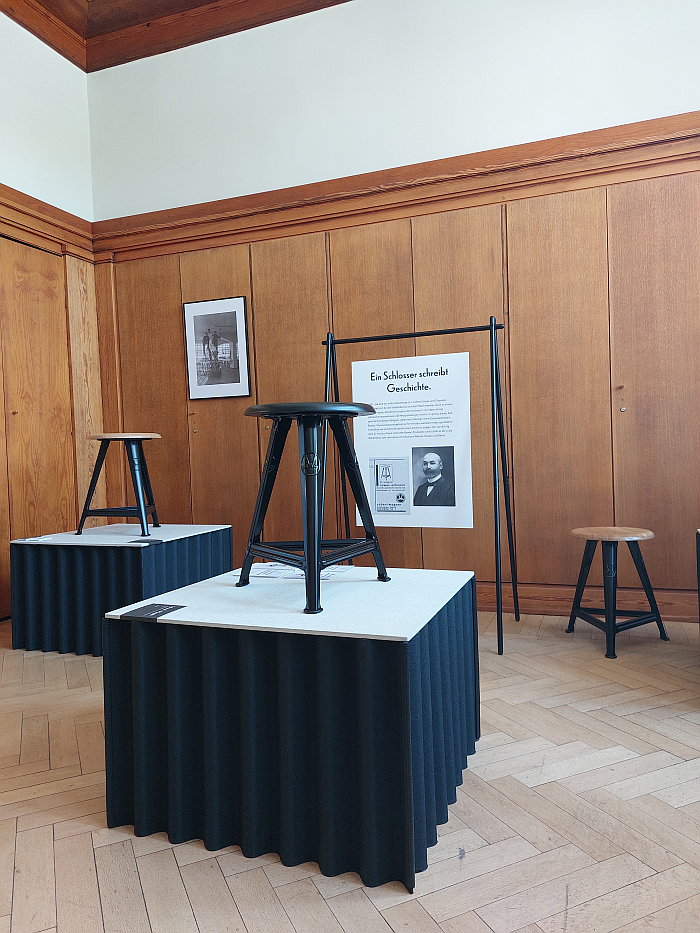
By the time the Peter-Behrens-Bau was inaugurated in 1917 Robert Wagner’s Rowac Schemel, one of the earliest seating objects crafted from lightweight sheet steel, had been on the market for almost a decade. If it was used in the workshops and offices of the Nationale Automobil-Gesellschaft, NAG, who, at that time, called the Peter-Behrens-Bau home, or by the wider AEG family to whom NAG was a member, and who so defined the industrialisation of the early 20th century in Berlin, we no know. But it certainly looked very comfortable when we met up with it in the Peter-Behrens-Bau during Berlin Design Week 2024.
Or more accurately, when we met up with with the relaunched Rowac Schemel in the Peter-Behrens-Bau during Berlin Design Week 2024, a relaunched Rowac Schemel that has been on the market for but a matter of weeks.
Has been physically available for but a matter of weeks: as we all remember, having entered production in 1909, and having become a staple feature, and important component, of the industrial and educational landscape of the 1920s and 30s, and thereby all but certainly a feature in the NAG factories and workshops, production of the Rowac Schemel ceased against the background of the 1939-1945 War. The Rowac Schemel remained however very much a thing; not only its robustness and durability ensuring its survival over the decades, nor only its flexibility and responsiveness, nor nor only only its comfort, but also its instantly accessible and inviting formal expression. But despite being a thing, it wasn't a thing in production. And then in 2018 optician Alide Amick and designer Dieter Amick met a Rowac at a flea market in Munich. A chance meeting that set Alide and Dieter off on a journey of inquiry and exploration that enabled the pair to appreciate in ever new ways and from ever new perspectives not only the technical and aesthetic joy of the Rowac Schemel but also its (hi)story as an active component of the early 1900s and the contemporary relevance of the Rowac Schemel. A journey of inquiry and exploration that ultimately saw Alide and Dieter acquire the rights to Rowac and begin to plan a relaunch of the Schemel in a version that remained true to Robert Wagner's design, down to the ingeniously, if improbably, formed feet and the rivets that are so important structurally and aesthetically yet so unfamiliar in contemporary furniture.
To that end a Kickstarter project was initiated to raise the required €100,000 to 'kickstart' production; production to be undertaken in conjunction with a number of small specialist firms within a 40km radius of the Chemnitz Robert Wagner and Rowac called home — RObert WAgner Chemnitz — and that as they explained in our 2023 interview because it is and was important for them both that the Rowac Schemel remained in its "home region ... the history of this furniture brand is based in the region and we are determined to continue that legacy", and also a desire "to make sure that Rowac wasn’t another company that was taken from the east and transplanted to the west". Of which there are many.
A Kickstarter funding goal they achieved, and in early 2024 the first Rowac Schemel's to be produced in almost a century were dispatched to their eager new owners.
A relaunched Rowac Schemel we met for the first time in the Peter-Behrens-Bau and which keeps all the promises made by the prototypes we met in Leipzig in 2023: not least offering a secure and comfortable sitting experience in an object with great deal of character but only little ego; and an object with unerring honesty, be that of aesthetic, function, correspondence, raison d'etre, etc. A work that elegantly underscores the point Dieter made about Rowac occupying "a unique position between design and work furniture": a Rowac Schemel is for helping you in the task at hand, be that as a stool, a table, a step, a whatever, isn't for looking at or showing off. Although you can. And your Schemel will happily let you. But that's not what it's for. And it understands that.
A relaunched Rowac Schemel Alide and Dieter presented at Berlin Design Week 2024 not only in the standard black frame but also with a blue frame, an exclusive Blue Moon edition for the Die Zeit shop; a major partnership at such an early stage of Alide and Dieter's stewardship of Rowac that, as with the success of the Kickstarter campaign, tends to underscore not only the contemporary relevance of the work that was a component of the decision to 'kickstart' production, but also the demand in a market awash with faux for industrial furniture worthy of the name.
And a relaunched Rowac Schemel that is but that start: Alide and Dieter also using Berlin Design Week 2024 to present a 'soon' to be released 75cm tall atelier/counter version. Back in the day Rowac sold their Schemel in 5cm height steps, the height adjustable stool not being a thing then, or at least not a thing in lightweight yet robust sheet steel, and so variety was needed to cover all use contexts. Alide and Dieter aren't going that far but in the higher version are not only offering a Rowac for all those who work at a conventional counter height, but also offering Rowac in the variety of high and low stools demanded by catering and hospitality venues and also in contemporary office situations. And a new version that also underscores that Alide and Dieter never intended only to produce the 50 cm Schemel that so defines Rowac as a manufacturer: the Rowac portfolio was extensive in terms of products and product genres, and Alide and Dieter very much intend to ensure that going forward it once again is. And thereby to allow Rowac to actively contribute to post-industrial society as much as it contributed to industrial.
Full details on Rowac can be found at www.rowac.com
Berlin Design Week 2024 has now ended, details of what you missed, and when and where the 2025 edition will be staged, can be found at https://berlindesignweek.com
